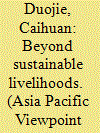| Srl | Item |
| 1 |
ID:
185107


|
|
|
|
|
| Summary/Abstract |
This paper delves into rural peasants' livelihood-related agrarian changes revolving around their three major livelihood strategies in Qinghai. These strategies include peasant agriculture, seasonal migrant labour and caterpillar fungus harvesting, the latter two of which have been adopted since the mid-1990s. The research particularly focuses on rural Tibetan peasants' lived experiences in their efforts to achieve sustainable livelihoods through these three strategies in a specific village context. In doing so, the paper highlights resources, qualifications, opportunities, changes and challenges in rural peasants' livelihood realities. The empirical evidence from this paper suggests that rural Tibetan peasants' diverse ways of making livelihoods have a greater potential to imagine and build sustainable and equitable livelihoods. I argue that sustainable livelihoods approaches must be pursued in tandem with a diverse economies framework for analysing rural peasants' present way of making livelihoods. This new and critical way of studying rural peasant livelihoods can particularly highlight non-capitalist economic relations and practices that are the major contributors to sustainable and equitable livelihoods for Tibetan peasants.
|
|
|
|
|
|
|
|
|
|
|
|
|
|
|
|
| 2 |
ID:
185115


|
|
|
|
|
| Summary/Abstract |
Anthropogenic climate change poses huge challenges to humanity. The frequency and magnitude of extreme weather is increasing. As more attention turns to disaster preparedness and recovery, it is worth recognising that many communities have a long history of living with the flux of planetary dynamism. They are experienced in negotiating collective well-being with one another and with the earth. Other communities have less experience and know-how and have had to adopt more experimental approaches. In this paper we draw on planetary social thought and critical disaster studies to re-think disaster recovery. We present stories of communities in the Philippines differently negotiating collective well-being in the face of climate uncertainty.
|
|
|
|
|
|
|
|
|
|
|
|
|
|
|
|
| 3 |
ID:
185111


|
|
|
|
|
| Summary/Abstract |
The rapid expansion of urban development in Asia over the last 50 years has seen a rise in demand for building materials. From large construction companies to squatter settlers seeking to improve their housing, concrete is the building material of choice. In the Philippines there is plentiful supply of the limestone and aggregate (sand and gravel) required for concrete production. Alongside the large quarries owned by major corporations are small, often illegal quarries, supplying aggregate to the construction industry. In these shadow places informal miners scratch out a precarious livelihood. They are members of a vast artisanal and small-scale mining (ASM) workforce that is global in extent. This paper situates informal aggregate mining in the diverse economy of concrete in the Philippines and within the context of global ASM studies. With a detailed study of one quarry on the edges of Metro Manila, it reveals how mining contributes to the survival portfolio of poor households. Without romanticising the lives of quarry labourers, we identify a range of negotiations by which informal miners create a community of commoners in a contested quarry site. This research provides insight into the capacities that informal miners could bring to designing more sustainable development pathways within and beyond the extractive industry.
|
|
|
|
|
|
|
|
|
|
|
|
|
|
|
|
| 4 |
ID:
083852


|
|
|
|
|
| Publication |
2008.
|
| Summary/Abstract |
Donors and aid agencies are now looking to strategies of pro-poor economic growth to raise living standards in developing countries. I critically examine how particular conceptualisations of economy and economic development shape the broader context within which pro-poor growth approaches are implemented by governments and development agencies. While pro-poor growth may expand a national economy, surplus will be distributed in a community and among individuals according to culturally specific logics. To exemplify this point I discuss the community economy of Bomolo on the remote, rural island of Flores, Indonesia. The Ngadha people of Bomolo are identified by the Indonesian state, religious organisations and development agencies as lacking and in need of economic development. Yet in Bomolo, gambling, although illegal and antithetical to development, is fantastically popular, and large amounts of cash surplus are spent on this popular pastime. I argue for more attention to the issue of surplus - the outcome of pro-poor growth. In particular, I propose that surplus distribution is a crucial yet underdeveloped component of the growth equation
|
|
|
|
|
|
|
|
|
|
|
|
|
|
|
|